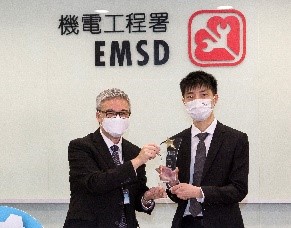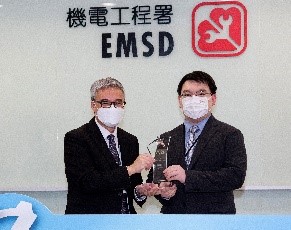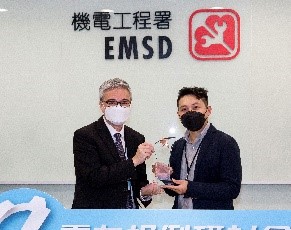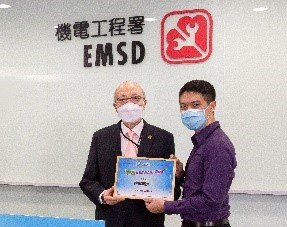Experience Sharing
Experience Sharing by Outstanding Registered Electrical Workers 2022
Gold Prize
YEUNG Wai-hung (Engineer)
The Hongkong Electric Company Limited
As a professional electrical works personnel, Mr YEUNG said that he needs to be acquainted, and to comply, with the requirements set out in electricity regulations and relevant codes of practice. Strict adherence to various in-house work safety procedures is also required during his daily course of work. Mr YEUNG always performs the following steps prior to any electrical work: inspect the surroundings of the site of work for risk assessment and formulation of relevant measures; provide work briefing to staff to familiarise them with their individual scopes of work as well as giving them safety reminders to observe at work; issue Electrical Safety Assessment Form and/or Permit-to-work to designated workers; and check his personal protective equipment (PPE) and that of all staff to ensure that everyone is equipped with and using appropriate PPE. He also takes charge in ensuring that the electrical installation concerned has been disconnected from its power source and then proceeds with locking up the switching device and putting up notices. Nonetheless, as a precaution prior to physical contact with the electrical installation, he will ensure that the installation is completely dead by testing with appropriate devices before commencing the electrical work.
Mr YEUNG Wai-hung thinks that the application of innovation and technology is the upcoming major trend in safeguarding occupational safety in the industry. Regarding the maintenance of rising mains, devices with movable cameras for conducting inspection tasks have been introduced. Such cameras, which can change directions and record videos, allow workers to observe some places that cannot be viewed directly. Safety is thus enhanced as workers can reduce excessive stretching or avoid work-above-ground activities.
Silver Prize
WONG Kin-man (Engineer)
The Hongkong Electric Company Limited
Mr WONG Kin-man considers that for a registered electrical worker, safety should be a top priority at all times, and the relevant code of practice and legal requirements should be complied with. For example, before commencing works, risk assessments must be conducted on-site to identify all potential risks and employ appropriate remedial measures. Mr WONG also thinks that registered electrical workers should keep pace with the times by learning and applying new knowledge and technologies to improve work safety and efficiency.
Mr WONG said that electrical workers often have to operate the switches of clients’ electrical installations when carrying out daily electrical work, such as switching off the power supply, locking out and tagging out the installations. They will definitely follow the established guidelines when performing electrical safety assessment and other relevant work. That said, incidents of operating the wrong switches and other human errors may occur in switch rooms where the environments are complicated. Mr WONG suggested that “Pointing and Calling Practices” should be applied by electrical workers at work to avoid accidents caused by negligence or carelessness. To be specific, workers should point at the objects to be examined and the completed work procedures to be inspected, and state aloud the inspection results or confirm loudly that the work procedures had been completed, thereby raising their alertness and vigilance and reducing human errors.
Bronze Prize
LAU Pak-kui
(Employer of a registered electrical works company)
Chun Mei Engineering Company
Mr LAU Pak-kui has been working in the electrical engineering industry for several years. He has mainly been involved in high voltage electrical engineering and has always attached great importance to electrical safety. When it comes to high voltage electrical systems, a slight negligence may result in death or injury with dire consequences. As such, his common practice is to discuss with relevant colleagues beforehand details of the works and particulars that warrant attention, so as to facilitate the formulation of various plans in advance. On the day of the commencement of works, he will also conduct appropriate risk assessment and ensure that all colleagues are well aware of the workflow and details of the day.
Mr LAU Pak-kui considered that frontline electrical workers should get familiar with the workflow before carrying out the works, assess whether there are enough protective gears for the works and propose relevant suggestions to the employers in a timely manner. They should stand fast at their posts during the works and stay alert to the latest situation, in order to ensure that works can be carried out under the safest condition.
Merit Prize
WU Kin-pang (Engineer)
REC Engineering Company Limited
Mr WU Kin-pang considered that electrical workers, as members of the trade, in addition to following the safety procedures and stipulated checking steps published in the Code of Practice, should also conduct dynamic risk assessments beforehand in accordance to different work environments and implement Pointing and Calling for high-risk procedures.
Dynamic risk assessment is conducted to understand and analyse the site environment before commencement of work. Briefing should then be conducted to inform all relevant colleagues their tasks of the day, their scope of work and the work procedures involving higher risks. Moreover, they should formulate critical processes, select suitable procedures and take measures to control additional risks bring about by the site environment (such as weather, public safety and so on). Apart from conducting dynamic risk assessment, it is most important to monitor the work progress continually during the works period and incorporate the “pointing and calling procedure” during critical processes (such as closure of isolation points) so as to make sure that work procedures are carried out properly.
While these two measures are not new, Mr WU hopes that these measures will be implemented during the works period and top-down leadership be maintained so that stakeholders will understand that safety is the fundamental element in carrying out the works.
Information for the Electrical Trade



